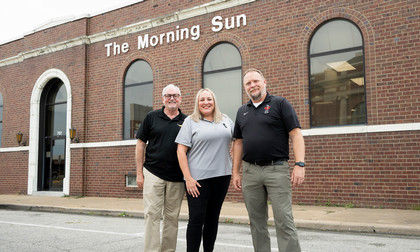
Josh Letner, who graduated from Pitt State in 2009 and 2010, went on to a career in the radio and newspaper industry and earned awards for his coverage of the May 22, 2011, tornado in Joplin. He taught in the Communication Department for four years and since 2017 has overseen the publication of the university’s student newspaper and yearbook.
Starting Sept. 1, the Pittsburg native will fill a gap left at the Sun by the departure of the paper's general manager, Justin Crain, who had been serving in an interim capacity.
Amy Sawyer, who graduated from Pitt State in 2007, was active on her high school newspaper and yearbook staff in Winfield, Kansas, and has a passion for community journalism.
Today, she serves as a small business advisor at the Small Business Development Center located at Block22 and is spearheading a business plan for the Sun to help it find its way forward.
The once daily and robust newspaper has gone through tumultuous times over the past decade, having once been locally owned, then bought up by a conglomerate, then sold to another conglomerate, then sold again. Subscriptions and advertising declined as both readers and advertisers turned to social media.
But social media doesn’t send reporters to meetings or analyze hot-button issues, nor is it guaranteed to go directly to a local reader’s hands every day, thanks to unpredictable algorithms.
Two years ago, a group of several local families stepped in with personal financial investments to save the paper. It hasn’t been easy: costs to produce newspapers, including newsprint, ink, and production costs, continue to rise. It’s now printed in Tulsa, which means press deadlines are much earlier.
The Sun has held on despite the odds, publishing Tuesday through Saturday and being delivered by mail. On any given day, it features a mix of business and education news, light features, arts, athletics, investigative reporting, obituaries, and photos of community events.
“You can’t have a strong community culture without strong shared stories, and you can’t have a strong civic culture without the accountability in local government – school boards and city and county commissions – that comes from the presence of a local newspaper,” said Shawn Naccarato, who leads a university division called Research + Economic and Community Development.
That division includes a collection of resources based at Block22 known as The Foundry. Among those resources: the Small Business Development Center, which helps businesses like the Sun with business analysis, strategic plans, marketing advice, and more.
“The tools we have at our disposal, the resources that we can connect businesses like The Morning Sun with – those can make the difference between a business succeeding or failing,” Naccarato said.
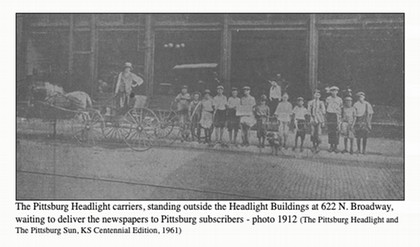
A report published in November 2023 by Northwestern’s Medill School of Journalism, Media, and Integrated Marketing Communications found there are about 6,000 newspapers left in America. In 2005, there were 8,891.
Of those, a majority (4,790) publish weekly, not daily.
“But here’s what’s startling,” Letner said. “That report predicts the pace of that loss will continue.”
Currently, 204 U.S. counties are without any local news outlet. About half of all U.S. counties (1,562) are served by one remaining local news source – typically a weekly paper. Of those, 228 are at high risk of losing their only local news source.
The authors of the report argue those statistics post “a far-reaching crisis for our democracy as it simultaneously struggles with political polarization, a lack of civic engagement and the proliferation of misinformation and information online."
“If a paper folds, it means no reporters are attending city commission meetings and pursuing those issues. It means no one is here to ask tough questions, research the answers, and provide an analysis for the public,” Letner said. “It also means historic documentation of our community stops – groundbreakings, ribbon cuttings, milestone moments. Those are all vital to us and we as a town will feel it if it goes away.”
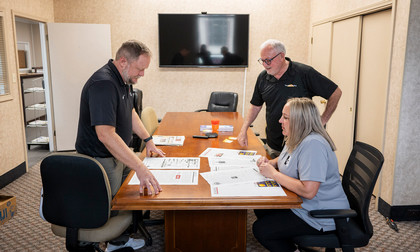
Last year, the family ownership group realized the old operating model was unsustainable. Lynda Wilkinson, who is among the investors, began researching what other newspapers were doing to survive. She visited with university leaders, including Letner and Naccarato.
“Josh has been involved in every subcommittee we’ve had since we started meeting, and we’re really making progress with ideas,” Wilkinson said. “It seemed like the natural step that Josh become more involved in the day-to-day operations to help us implement those new strategies.”
In addition to his duties at the Sun, Letner also will continue to oversee the university student newspaper and yearbook.
The Community Foundation of Southeast Kansas agreed to serve as the Sun’s philanthropic sponsor for what has become known as the Save Local Journalism project, which seeks to raise funds from the community to help it continue.
Ken Ward, a professor in the university’s Communication Department who has expertise in daily newspapers and their decline, also has a passion for helping student journalists to gain real-world experience.
He is working with Letner and Sawyer and Morning Sun news editor Ron Womble on a plan to provide students those experiences that at the same time would shore up the Sun’s reporting staff.
Same goes for photography opportunities through the university’s photography program, Sawyer noted.
Another team is networking with alumni who work in the printing industry to evaluate possibilities of acquiring a modern, efficient in-house printer that would help the paper save hundreds of thousands of dollars a year now being spent in Tulsa.
Letner pointed out it could open up revenue streams if the Sun were to use it to print other local publications in Southeast Kansas that are facing similar challenges.
“When we put this strategic plan in place and get it locked in, it can be replicated in other communities across the country that are facing the same thing,” Sawyer said. “Local newspapers are vital, and we are going to do all we can to help save ours.”
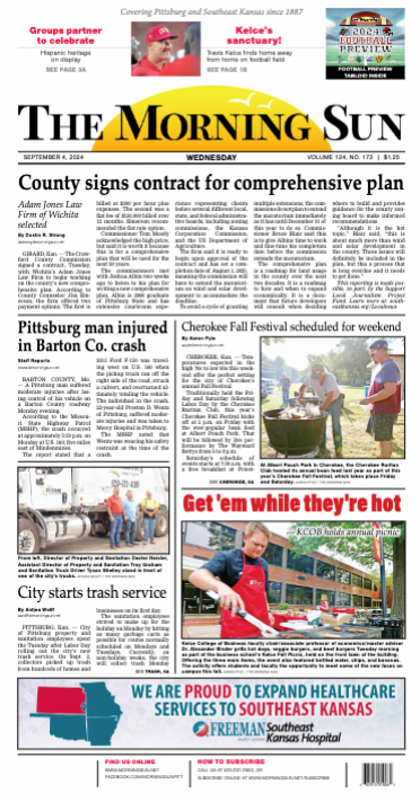
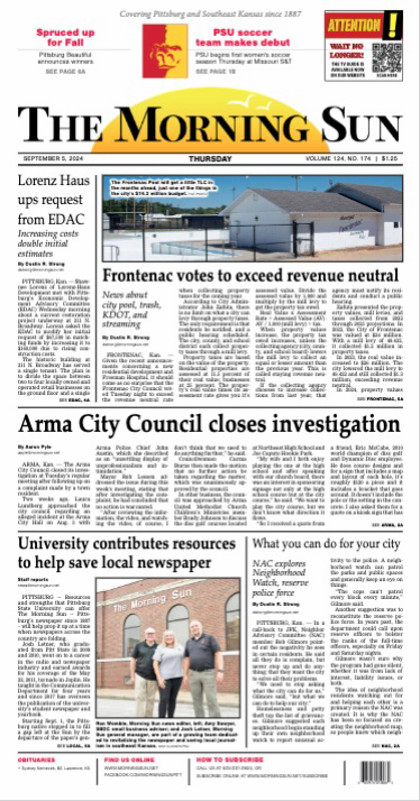
Gordon Elliott, one of the newspaper investors, said it’s “important for the community to know that the newspaper business is hard, and we’re having difficulty keeping it open.”
“Justin helped us stabilize it, but he didn’t intend to be a longtime manager,” Elliott said. “Getting Josh on board will help bring us to the next level.”
Doing so is crucial, he added.
“It’s amazing to me when you talk to people around town how many have never heard of something, but then they say they don’t take the newspaper,” he said.
“This group of people who stepped up to save it, they didn’t do so to control it or to try to make money off of it. It was to save it because it’s of value to Pittsburg. The only way it will survive is if it truly is a community-owned newspaper that people support.
“Newspapers are not only important,” he said, “they’re vital.”